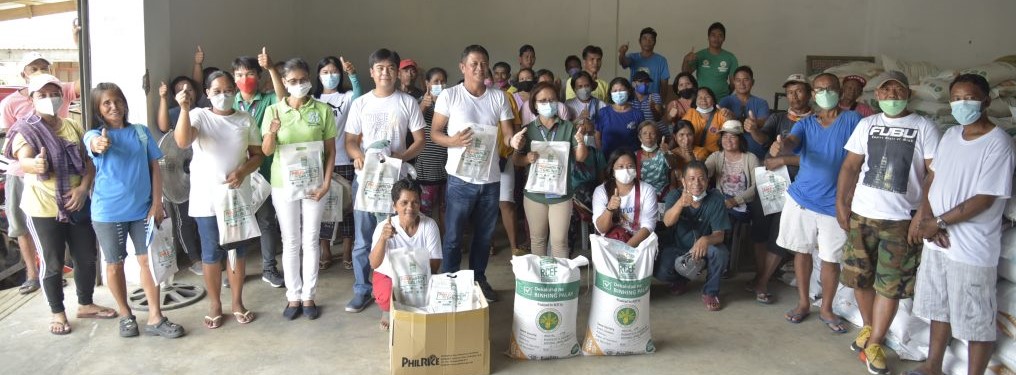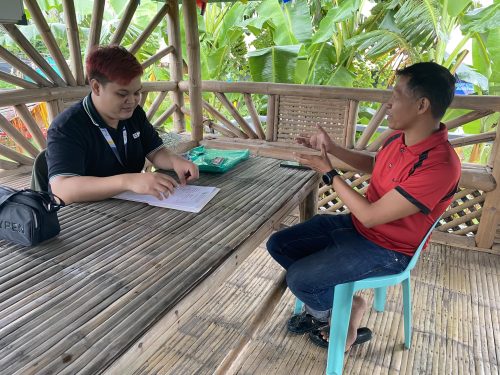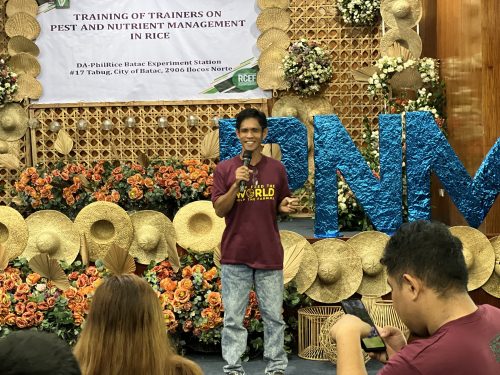RCEF seeds bring increasing benefits to farmers
Gains from the Rice Competitiveness Enhancement Fund (RCEF) Seed Program continue as it reaches more than one million rice farmers across the country through its inbred rice certified seed delivery and distribution activities.
Data from the RCEF Rice Seed Monitoring System showed that 11,952,883 bags of certified seeds were distributed to the farmers from its launch on Sept. 16, 2019 to March 15 this year. The distribution covers seven seasons of implementation from 2020 dry season to the recently concluded 2023 dry season.
“Majority of the one million farmer-beneficiaries received certified seeds multiple times across seasons. We estimate that at least 1.5 million hectares are being planted annually,” said Dr. Flordeliza Bordey, head of RCEF Program Management Office at the Department of Agriculture – Philippine Rice Research Institute (DA-PhilRice).
(FB, DA-PhilRice Negros, August 22, 2023)
A monitoring and evaluation survey also reported that the average yield of the RCEF seed recipients increased from 3,630kg/ha to 4,320kg/ha in the dry season, and from 3,690kg/ha to 4,020kg/ha in the wet season. The respondents were from the 42 low and medium-yielding target provinces of RCEF.
Bordey said that the total seeds distributed across all seasons account for almost 100% of those delivered to LGU partners.
“We have distributed most of the seeds with some remainder kept as reserve stock for distribution for early planters in the next cropping seasons, following the existing guidelines,” she said.
Bordey noted possible variations in data on the program’s accomplishments owing to the timing of the release of reports based on fiscal year and cropping season.
“Fiscal year report ends in December, while seasonal report, especially for dry season, is released in March of the succeeding year. The timing difference will make it appear that there is huge remaining seed stock in December but these are actually being distributed until March within the same season,” she said.
Meanwhile, less than one percent of the total delivered seeds were reportedly damaged and were repurposed for disposal or donation.
Bordey emphasized that the Institute ensured proper documentation according to government auditing and accounting regulations.
Addressing the issue of damaged stock, Bordey highlighted the vulnerability of seeds to environmental factors.
“Seeds are living organisms. Its viability as planting material is subject to exposure to environmental factors including changes in temperature and humidity, flooding, and infestation of storage-related pests like weevils, rodents, and birds,” Bordey stressed.
She noted that the seed stock, which were retested and found not suitable for planting owing to low germination, but were fit for human consumption, were donated to the local government units’ social welfare and development offices during the pandemic for their outreach and social service-related activities, following the program’s implementing guidelines. These were accounted for through deeds of donation.
DA-PhilRice had also implemented additional guidelines to avoid overstocking of seed reserves in facilities with prior damage.
“The Institute and the LGUs agreed to deliver the seeds in tranches. The LGUs’ requests for seed deliveries are granted after distributing their existing seed stock to the farmer-recipients,” Bordey said.
Furthermore, she said that unutilized seed stocks were transferred to other cities or municipalities in need if not distributed by LGUs within one month.
Seeds stored at seed grower cooperatives and associations (SGC/As) facilities can also be reserved for early planting, provided these pass recertification with an 85% germination rate.
Bordey also guaranteed that SGC/As are committed to replacing seeds that fail recertification at no extra cost to the government, underscoring accountability within the program. (DA-PhilRice)

Latest Posts
-
ATI-CL Exposes LSA Cooperators to Agro-Enterprise Clustering approach
ATI Central Luzon evaluates Bonagua Integrated Farm to be featured on Documentation of Exemplar Beneficiaries for RCEF. Earlier today, Technical Support Staff IV, Mr. John Patrick Gutierez, conducted an initial interview of Mr. Darwin Bonagua for the Documentation of Exemplar Beneficiaries for RCEF. The initial interview revolved around the operation of farm through RCEF activities…
-
Pag-asa para sa progresibong agricultura🌾
Sa bawat binhing itatanim, naroon ang pag-asang mag-ani ng masagana. Ngayon, 15 na bagong bihasa sa Pest and Nutrient Management ang handang magbahagi ng kanilang natutunan upang masiguro ang mas mataas na ani at kita ng ating mga magsasaka. Kasama sa mga nagsipagtapos ng RCEF Training of Trainers ay mga extension workers at farm school…
-
WAG MAGPASCAM!
Tingnan ang pagkakaiba ng legit at fake FB accounts na hawak ng DA-PhilRice.I-report agad ang mga mapagpanggap na FB pages ng DA-PhilRice, RCEF Seed Program, at RCEF Extension Program.



